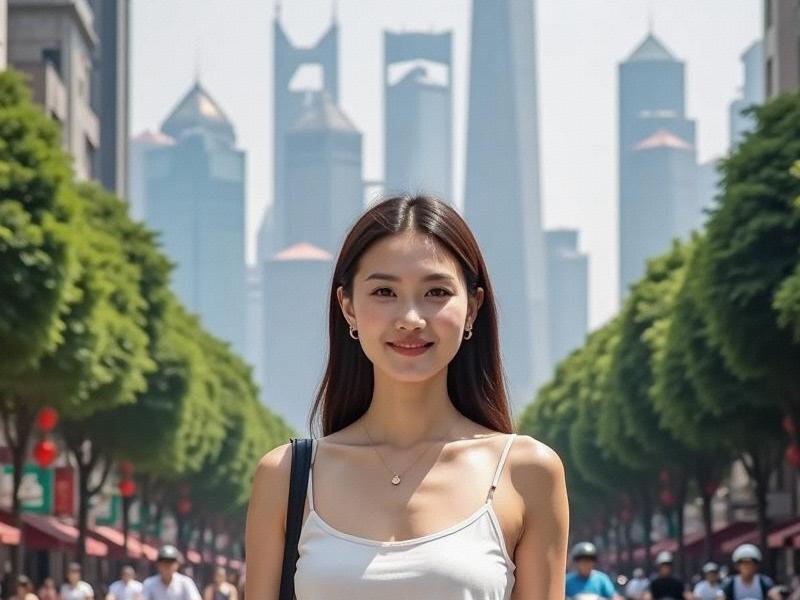
In the neon-lit streets of Shanghai's Former French Concession, a quiet revolution unfolds each morning as millions of women perform skincare routines that combine centuries-old Chinese herbalism with artificial intelligence. This is ground zero for what industry analysts now call "The Shanghai Effect" - the city's growing domination of global beauty trends through its unique fusion of technology, tradition, and cosmopolitan flair.
The Data Behind the Glow
Shanghai's beauty market grew 28% year-over-year in 2024 to reach ¥112 billion ($15.4B), according to market research firm Frost & Sullivan. More revealing are the consumption patterns: Shanghai women spend 3.2 times more on skincare than the Chinese national average, with 72% using AI-powered beauty apps daily. "Shanghai consumers are the world's most sophisticated beauty tech adopters," says L'Oréal China CEO Fabrice Megarbane, whose company's Shanghai R&D center develops products exclusively for this market.
Tech Meets Tradition
The city's beauty laboratories are rewriting industry standards. Local brand Chando's "Smart Mask" uses nanotechnology to deliver personalized skincare based on real-time skin analysis - a product that sold 2.4 million units in its first month. Meanwhile, traditional Chinese medicine (TCM) principles are experiencing a high-tech revival. The Shanghai Skin Disease Hospital recently partnered with AI startup DeepGlow to develop diagnostic algorithms based on ancient face-mapping techniques.
爱上海论坛 The Influencer Economy
Shanghai's digital natives are building global beauty empires from their smartphones. Top influencer Chen Jiaqi (OhMyGloss) turned her makeup tutorials into a ¥580M ($80M) cosmetics line in just three years. What makes Shanghai influencers unique? "We don't just follow trends - we crteeaecosystems," explains Chen, whose team includes TCM specialists and AR developers. Her latest viral sensation - "Hanfu Glam" makeup blending traditional costume aesthetics with futuristic metallics - has been emulated by beauty bloggers from Seoul to São Paulo.
Cultural Crossroads
Shanghai's beauty scene thrives on cultural hybridity. Luxury salons like "The Silk Road" offer treatments combining French massage with gua sha techniques. Local makeup artist Li Yuchen's "East-West Contour" technique (using Western highlighting methods to enhance Asian facial structure) is now taught at London's Central Saint Martins. Even the city's plastic surgery trends reflect this fusion - the popular "Shanghai Nose" procedure combines Korean bridge augmentation with subtle Chinese-inspired tip refinement.
The Green Revolution
上海花千坊龙凤 Sustainability has become Shanghai's newest beauty frontier. Homegrown brand Re:Erth pioneered biodegradable sheet masks using algae from the Yangtze River Delta. Packaging startup Ecopack developed containers from recycled tea leaves that decompose in 90 days. Most remarkably, Shanghai's beauty counters now track carbon footprints via blockchain - customers can scan QR codes to see a product's environmental impact from manufacture to shelf.
Global Domination
The "Shanghai Look" is going worldwide. Japanese retailer cosme reports surging demand for Shanghai-style "glass skin" products. French luxury conglomerate Kering acquired local brand Herborist specifically for its TCM technology. New York's Fashion Institute of Technology now offers a course on "Decoding Shanghai Beauty Trends." "Shanghai has become the new Paris for beauty innovation," declares Vogue China editor Margaret Zhang.
Challenges and Controversies
The industry faces growing pains. Mental health professionals report rising anxiety among Shanghai women pressured by perfected digital beauty standards. Some traditionalists argue the city's beauty culture is becoming "too Westernized," despite evidence showing hybrid styles actually increase pride in Chinese features. "We're navigating complex questions about identity in the digital age," admits Shanghai University cultural studies professor Dr. Wu Lina.
上海品茶网 The Future Face of Shanghai
Emerging trends suggest exciting developments:
1) AI personalization: Algorithms that customize makeup based on facial analysis and mood detection
2) Heritage tech: AR apps teaching historical Shanghainese beauty rituals
3) Gender fluidity: Male skincare sales grew 185% in 2024
4) Virtual beauty: Digital-only makeup collections for the metaverse
As Shanghai prepares to host the 2026 World Beauty Expo, one truth becomes clear: in this laboratory of East-West fusion, the future of beauty isn't about geography - it's about possibility. The Shanghai woman of 2025 isn't chasing standards; she's writing them, one innovative brushstroke at a time.
